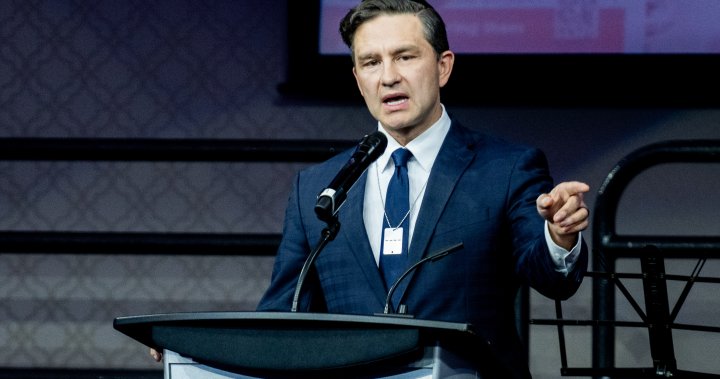Conservative Leader Pierre Poilievre made headlines by advocating for Israel to pre-emptively strike Iran’s nuclear facilities, calling it a gift to humanity. This controversial stance was first expressed during a commemoration event in Ottawa marking the one-year anniversary of an attack by Hamas against Israel. Poilievre believes that striking these facilities would prevent Iran from developing nuclear weapons, which he views as a dangerous and irresponsible prospect. He has a longstanding hardline approach to Iran and holds the country responsible for various acts of violence in the region. Poilievre’s statements have been met with mixed reactions, as other world leaders caution against such actions for fear of escalating tensions.
During his speech, Poilievre emphasized the importance of supporting Israel’s right to defend itself against Iran and other threats in the region. He suggested that proactively striking Iranian nuclear sites and oil installations could help defund the terrorist regime and prevent the use of nuclear weapons. While Iran claims to have a fatwa against the development and use of nuclear weapons, concerns remain about the country’s nuclear program and its potential to quickly produce such weapons if pushed into a corner. Poilievre’s remarks align with the views of other conservative leaders who prioritize national security and view Iran as a significant adversary.
In response to Iran’s recent ballistic missile attack on Israel, Canadian officials including Prime Minister Justin Trudeau and Defence Minister Bill Blair have emphasized the need to prevent a wider war between the two nations. While Blair suggested that it would be appropriate for Israel to target Iranian oil production facilities, he did not explicitly mention striking nuclear sites. The Biden administration has called for a proportional response and emphasized the importance of avoiding further escalation in the region. Discussions between the US and Israeli counterparts are ongoing to determine the best course of action in response to Iran’s aggression.
Former President Donald Trump has expressed support for targeting Iran’s nuclear facilities as a primary focus, contrasting with Biden’s approach of prioritizing a proportional response. Vice President Kamala Harris has stated that disrupting Iran’s aggressive behavior and holding them accountable will be a key priority for the US. Despite differing opinions on how to address Iran’s actions, there is a shared goal among world leaders to prevent a full-scale war in the Middle East. Israel’s potential strategies to counter Iran’s threats, including targeting other significant installations, remain a topic of speculation and debate among military experts.
Overall, the situation involving Israel, Iran, and the broader Middle East remains complex and volatile. The involvement of various world leaders, including Poilievre, Trudeau, Biden, and Harris, reflects the importance of diplomacy and strategic decision-making in handling regional conflicts. The ongoing discussions between the US, Israel, and other allies highlight the challenges of balancing security concerns with the risk of further escalation. As tensions persist in the region, finding a peaceful resolution to the conflict and preventing the proliferation of nuclear weapons remains a top priority for the international community. The differing perspectives and proposed courses of action underscore the need for careful deliberation and collaboration in addressing the evolving situation in the Middle East.


